"Source of this article: Guangzhou Daily"
In the history of Guangzhou’s foreign exchanges, apart from the exchange of visits between the government and citizens, these naive "animal diplomats" such as giant pandas, flamingos, mandrills, hippos and baboons are also worth mentioning. In fact, many citizens may have met them in the zoo!
How are these lovely "animal diplomats" doing now? Have they all had children? On the afternoon of November 22nd, Guangzhou Daily reporter came to Guangzhou Zoo to follow the steps of animal keepers and learn about their recent situation. These naive animals can be described as "bursting with popularity" in the park, attracting many citizens and tourists to stop and watch.
The hippopotamus Handa in Fukuoka, Japan:
Eating carrots and apples every day has given birth to 15 baby hippos.
Although it was Monday, when I came to the hippo living area of Guangzhou Zoo, the reporter found that many tourists were watching and taking pictures outside the guardrail, and many parents were explaining to their children.
"Handy, clear!" Liu Zufang, the breeder, approached the hippo’s hut and clapped his hands. Hearing the sound, two huge hippos suddenly walked into the small lake and swam towards the shore, waiting for feeding with their mouths open "meekly". Master Liu came to the lake with a plastic bucket filled with a dozen carrots and several apples, and successfully started the daily feeding process.
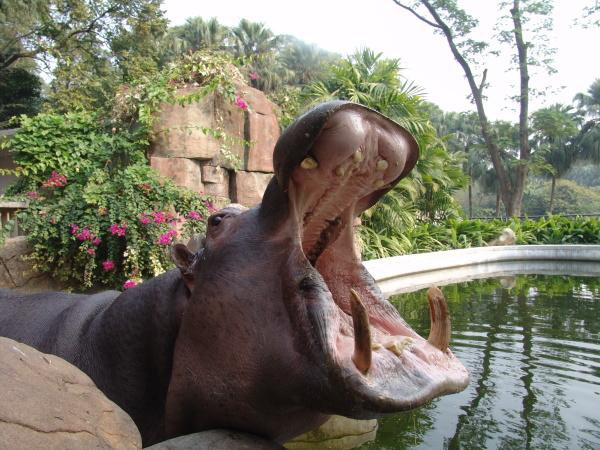
▲ Yida
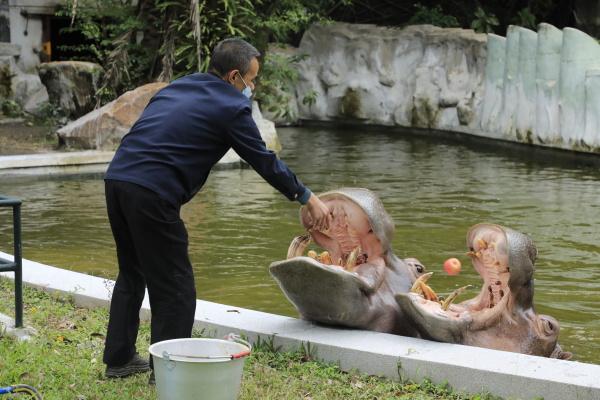
Fukuoka, Japan is the first sister city in Guangzhou. The two cities have active exchanges and frequent exchanges in the field of animals. In 1980, Guangzhou borrowed giant pandas to Fukuoka, which caused a sensation in Fukuoka and even Japan. Since then, the two sides have also exchanged animals such as red-crowned cranes and flamingos.
In 2003, on the occasion of the 25th anniversary of the Sino-Japanese Treaty of Peace and Friendship and the 25th anniversary of the establishment of the two cities, Yamasaki Hirotaro, then mayor of Fukuoka, Japan, sent a special letter saying that he would give a hippo to Guangzhou, hoping to express the sincere greetings of Fukuoka citizens to Guangzhou citizens through animal donation.
On October 1st of the same year, Handa (English name: kanta), a male hippopotamus from Fukuoka Zoo, Japan, bearing the friendship between Guangzhou and Fukuoka, settled in Guangzhou Zoo. This lovely hippopotamus was born in Japan on December 26th, 2000. After he came to Guangzhou Zoo, he quickly tied the knot with the female hippopotamus born in this park. Handa is 21 years old this year and has become the father of 15 hippo babies.
"Handa is currently in good physical condition, weighing 1.5 tons, and eating about 2 pounds of carrots and 1 pound of apples every day." Liu Zufang has worked in Guangzhou Zoo for more than 40 years, and he is familiar with the living habits of various animals. In 2017, he began to take over the feeding work of Handa. At first, Master Liu was a little afraid of hippos. After getting familiar with them, he felt that they became cute. "Now I feel that these animals are like their own children."
"I didn’t know this hippo was sent by Fukuoka before. These animals are precious gifts, and we should take good care of them. " After hearing the explanation from the breeder at the scene, Miss Wu told reporters.
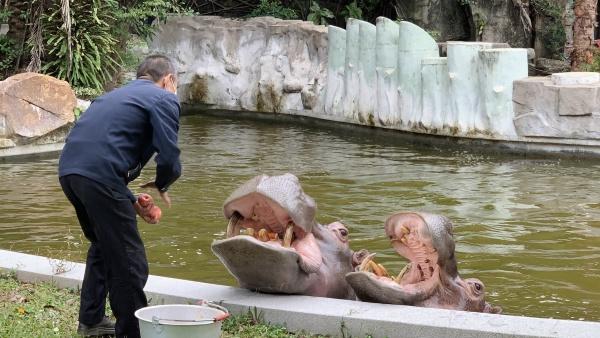
● Asian elephants in Vietnam:
Four hybrid elephants have been bred and their offspring can understand Cantonese.
When I came to the Asian Elephant Garden, I only heard the breeder Wu Qiyuan shouting "Baolong" and "Yuelong" in Cantonese. To everyone’s surprise, not long after, an elephant nearly 3 meters high came out of the rest house. This elephant, weighing nearly 5 tons, is called "Yuelong". It turned out to be a "hybrid elephant" and the largest Asian elephant in the park now.
Elon, a female Asian elephant, was a gift from Ho Chi Minh, a former Vietnamese national leader, to children in Guangzhou in 1960. She was 21 years old when she entered the park. After coming to Guangzhou Zoo, Elon not only acted as a messenger of friendship, but also took on the heavy responsibility of breeding offspring. He married the Asian elephant Babao who entered the park in Guangzhou Zoo in 1959, and successively bred four Asian elephants, including two sons, Baolong, 45, and Yuelong, 41, who have been exhibited in Guangzhou Zoo ever since. Elon and Babao died in 1983. They were made into specimens and placed in the Museum of Biology of Sun Yat-sen University.
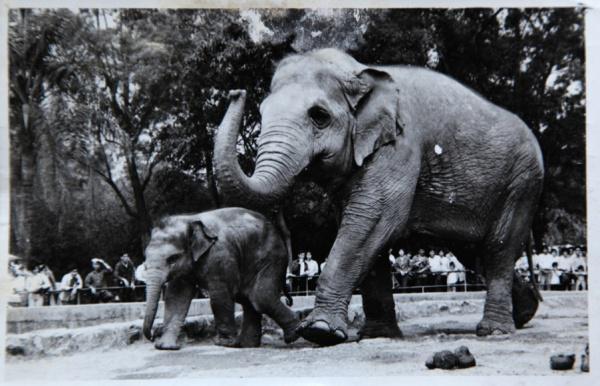
"’Yuelong’ eats 380 kilograms of food every day, including grass, fruit, corn and so on. Usually, we also give each elephant a regular physical examination. " Wu Qiyuan studied veterinary medicine, and he admitted that he became a breeder because he liked elephants. "I hope to visit Vietnam one day and learn from their experience in caring for Asian elephants."
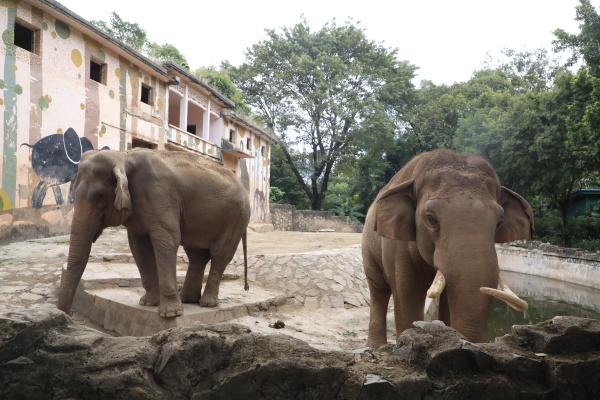
● Seychelles is a national ritual turtle;
"Cantonese-style recipes" can last as long as 200 years.
In October 2014, the rare giant Adabora elephant turtle from Seychelles, a beautiful island country in Africa, came to Guangzhou as a "diplomatic envoy" and officially checked into Guangzhou Zoo. Seychelles foreign ministers, ambassadors to China and garden representatives witnessed this grand event in Panlongyuan Park, and held a handover ceremony for the elephant turtle to settle in Guangzhou.

According to the staff of Guangzhou Zoo, the longevity of turtles is well known, and the elephant turtle is a well-deserved "longevity male among turtles". Adabora elephant turtle is the longest-lived tortoise in the world, with a life span of more than 200 years. When she entered Guangzhou Zoo, this Adabora elephant turtle was about 20 to 25 years old, and she was still a "young man" among the elephants. Elephant turtles eat a lot and can eat more than 20 kilograms of fresh leaves and other plants a day. After coming to Guangzhou, the garden also specially prepared "Cantonese-style recipes" for them, such as sweet potato vines, fruits and leaves.


"We all call it Dada, with a gentle personality and a weight of more than 230 kilograms. The Adabora elephant turtle comes from Seychelles, Africa, and its suitable living temperature is 28℃-30℃. It adapts well in Guangzhou most of the time. " Recently, the temperature in Guangzhou has dropped, and the breeder Chen Hong and his colleagues specially turned on the heating lamp for the elephant turtle in the house. See Chen Hong patted Dada’s back, and after stroking the turtle’s foot several times, it stood up obediently. "Dada likes brightly colored food. When we guide it to transition, we will use some green leafy vegetables or carrots to guide it to crawl."
"The elephant turtle has a long life, and we also expect it to live comfortably in Guangzhou Zoo." Chen Hong said.
Text/Guangzhou Daily Xinhua City reporter Zhang Shuhong
Figure/Guangzhou Daily Xinhua City reporter Luo Changwei
Video/Guangzhou Daily Xinhua City reporter Luo Changwei and Zhang Shuhong
Guangzhou Daily Xinhua City Editor: Ma Junxian
Reporting/feedback